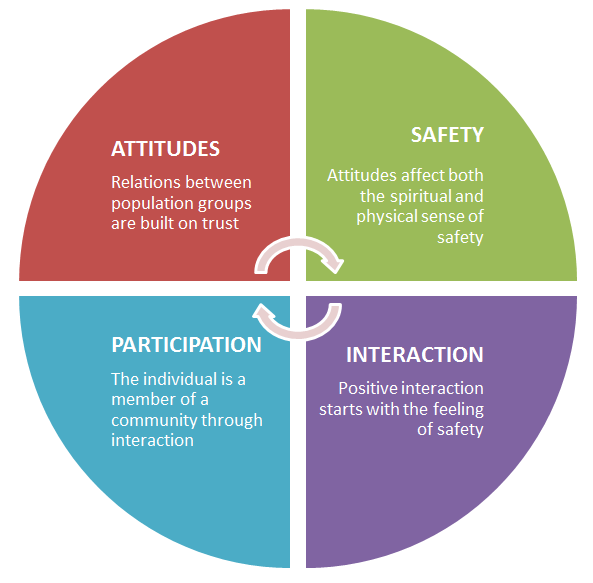What affects good relations?
The answer to the question ‘What affects good relations?’ is short and simple: Everything. But the answer is far from being simple.
Relations are present in everyone’s daily life, in public spaces where we move about and in the relationships that we form. The realisation of the true equality of people belonging to different population groups depends on their social standing, awareness of their rights and their opportunities to influence matters concerning their own lives.
The four areas (attitudes, safety, interaction and participation) affecting the relations between population groups also impact on each other. It is good to examine the relations as a whole so that their consequences become visible. The following examples illustrate the impacts of relations in people’s lives:
Good relations
Jaana is a 40-year-old telecommunications engineer. Since she was a child, her parents, relatives and teachers supported Jaana’s desire to study and engage in sports actively. Jaana has been a member of the paralympic sitting volleyball team three times. As a student, she sometimes encountered challenges in entering classrooms since the school was not completely accessible. Supported by a personal assistant and her fellow students, she progressed with her studies and was also an active member of the student union. Jaana has advocated the rights of students with disabilities also after her graduation. Jaana has no problem moving about the office in her wheelchair, and she feels that she is an equal member of her current work community.
Poor relations
Aleksi has just dropped out of vocational school. At the age of 17, going to school seems futile. After all, studying did his parents no good. Both of them are now unemployed, and often there is a shortage of just about everything at home. Aleksi was put out when his classmates had new clothes and cool backpacks. At least his phone is relatively new. Aleksi bought it at the end of his short stint of delivering ads; what’s the point of constant working. Aleksi is not interested in societal issues and he does not feel particularly close to other people of his age, because they don’t understand how difficult life really is. Aleksi prefers playing alone to being criticised by others; in the world of games he can forget the gloom around him and feel part of a virtual community.
Indicators on Good Relations
Good relations crystallise into four areas. Their combined impact makes it possible to asses and rework the relations between population groups. These areas are attitudes, experience of security, interaction and inclusion. The measurement tool developed in the UK has indicators designed for each segment that give a more accurate picture of the status of relations. Various actors have the possibility to affect relations consciously by noting the indicators in their own activities. This can be done either by planning activities that affect relations directly or by drawing attention to the effects that existing activities have on relations.
The indicators used for fostering good relations are described below for each area:
